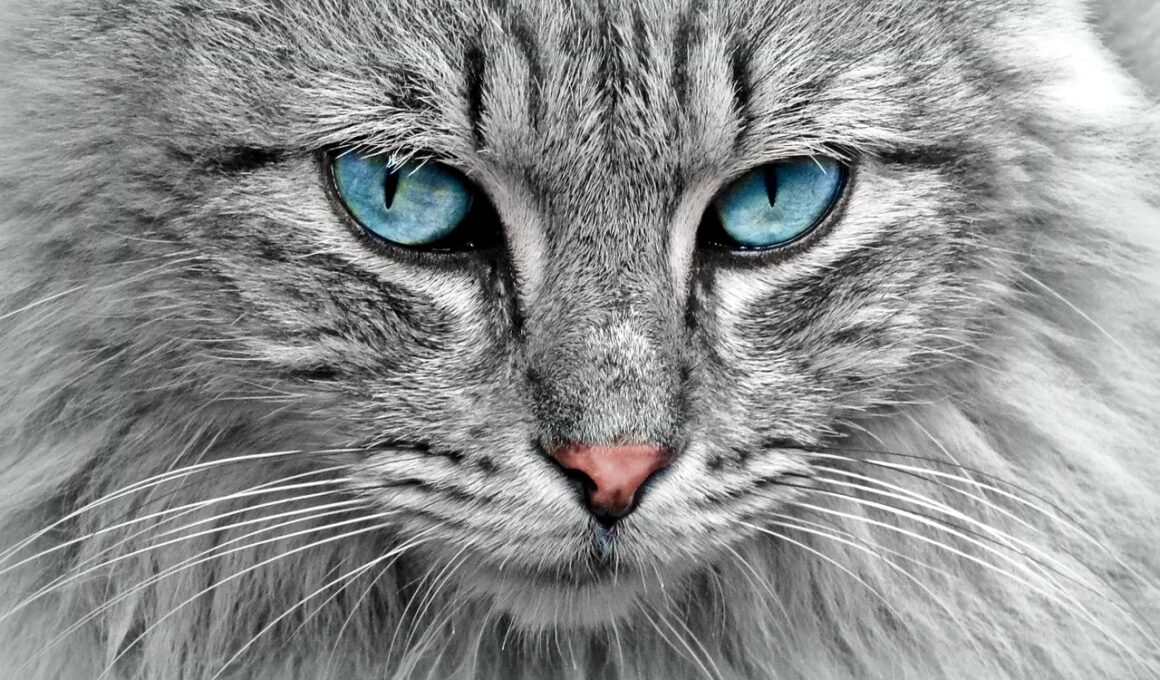Natural Remedies to Help Stop Cat Spraying
Cat spraying can be a frustrating problem for pet owners. Understanding why cats spray is crucial in addressing the behavior. Often, a cat will spray to mark territory or express stress. Natural remedies can effectively deter this behavior. One of the most commonly used remedies is using essential oils. Oils like lavender or chamomile can provide calming effects. Try placing a few drops mixed with water in a spray bottle. Spray a small amount in the areas where your cat tends to spray. Another effective remedy involves using pheromone diffusers. These products mimic the natural feline pheromones that calm cats down. You can find these at most pet stores or online. Lastly, ensuring your cat feels safe in its environment is key. Provide plenty of interactive toys and regularly engage them during playtime. This not only distracts them but helps reduce stress levels too. Following these natural remedies can significantly decrease the chances of spraying and help create a more harmonious home. Spend time observing your cat’s behavior to tailor your approach effectively.
Creating an enriching environment for your cat is vital in preventing spraying. Cats are naturally curious creatures who thrive on stimulation. By offering a variety of toys, such as scratching posts and climbing structures, you can entertain your cat and keep it engaged. Regularly rotating the toys helps maintain novelty and prevents boredom. Furthermore, interactive toys that respond to your cat’s movements can help channel their energy positively. Make sure to provide ample places for them to explore safely. Additionally, consider safe outdoor access if possible. Cats enjoy exploring their surroundings, and supervised outdoor time can reduce stress at home. Creating a cozy single area where your cat can retreat is just as important. Use soft bedding and quiet spaces. Consider using a pheromone diffuser, too, in this designated space. This can promote relaxation and reduce anxiety. Finally, involving your cat in your daily routine will strengthen your bond. Schedule play sessions, grooming time, and cuddles into your day to connect with your cat meaningfully. With these strategies, you can create a safe and loving environment for your feline friend, greatly reducing the chances of spraying.
Adjusting Your Cat’s Diet
Diet plays a crucial role in a cat’s overall behavior. Poor nutrition can lead to anxiety and dissatisfaction, potentially triggering undesirable behaviors like spraying. Ensuring your cat has a balanced diet can help significantly with their emotional well-being. Research indicates that some ingredients may affect mood and behavior in cats. High-quality proteins, essential fatty acids, and certain vitamins are vital. Consulting your veterinarian for dietary recommendations is advisable. Sometimes, food with specific nutrients can decrease anxiety in felines. Additionally, maintaining regular feeding schedules can help cats feel more secure and reduce territorial instincts. Avoid frequent changes in diet, as this can lead to upset stomachs and increased stress. If your cat is finicky, gradually introduce new food types. Treats can also integrate well with this strategy, but they should not replace regular meals. Always read labels to ensure you are providing appropriate options for your cat’s needs. Additionally, consider incorporating cat-safe herbs like catnip, which can have a calming effect. A comfortable diet designed to suit your pet’s needs creates a more relaxed environment, drastically contributing to reducing spraying behaviors.
You can also utilize natural behavioral modifications in tandem with dietary adjustments. For example, maintaining a consistent routine helps your cat understand what to expect throughout the day. Cats thrive on habits; thus, feeding, playtime, and social interaction should happen around the same time each day. With a reliable schedule, your cat is less likely to engage in stress-driven behaviors. Another effective natural method is utilizing calming supplements. Over-the-counter remedies made from natural ingredients can help reduce anxiety and aggression in cats. Products containing L-theanine or tryptophan have shown effectiveness. As always, consult with your veterinarian before introducing new supplements into your cat’s routine. Furthermore, practicing positive reinforcement can discourage unwanted behaviors. When your cat uses the litter box instead of spraying, reward them with treats or affection. This encourages them to associate good behavior with positive outcomes. Training and understanding your cat’s reactions to various situations enhance the bonding experience. Remember that patience is key in this process. Take the time to cultivate an atmosphere that fosters security and happiness, ultimately helping to eliminate the habit of spraying.
Essential Techniques for Stress Reduction
To further reduce stress in cats, consider calming techniques such as gentle massage or scratch sessions. Cats often respond well to touch and can find comfort in gentle stroking. This can promote relaxation, which in turn decreases the likelihood of stress-induced spraying. Regular grooming not only keeps your cat looking stunning but can serve as a bonding activity that reinforces trust. Explore cat training classes that focus on positive methods for behavior management. These classes can provide you with comprehensive strategies and make the learning process enjoyable for your cat. Using background music or even environmental sounds can provide comfort. Music specifically tailored for pets can create a calming ambiance. Another natural technique involves creating a controlled environment with minimal sudden noises or disruptions. Apply soft lighting after dusk and maintain quietness during the night. Consider implementing anxiety-reducing gadgets like diffusers or sprays, which can mimic the scents that make cats feel safe. Diving into relaxation methods will significantly enrich your cat’s emotional health and ultimately lead to fewer incidents of spraying. Use a variety of approaches to provide a well-rounded approach to creating a harmonious living situation.
Additionally, understanding your cat’s body language is essential for preventive measures against spraying. By recognizing signs of stress, discomfort, or anxiety, you can intervene before the behavior escalates. Watch for changes in posture, grooming patterns, or vocalizations. Creating a safe zone for your cat with high perches can help as well; this gives them control over their surroundings. Encourage exploration with safe hiding spaces like cardboard boxes or tunnels. This reinforces their sense of security. Moreover, consider using natural calming sprays or diffusers with essential ingredients that are safe for cats. Herbal remedies can also help soothe a catchy cat and promote relaxation. The presence of high-quality litter is beneficial too since an uncomfortable litter box can lead to unwanted behaviors. Ensure you clean the litter box frequently and that it is well-stocked with preferred litter. Engaging your cat in play can also help. Schedule regular interactive sessions to offer mental stimulation and physical engagement. All these steps can help reduce stress levels, consequently decreasing the chances of spraying. By observing and attending to your cat’s needs, you can nurture a happier, healthier feline friend.
Consider Expert Consultation
If you continue to encounter issues with cat spraying despite trying the above remedies, consulting an animal behaviorist may be your next step. They specialize in understanding feline behavior and can provide tailored strategies for your unique situation. It is important to choose a professional who uses humane and positive training methods. They can assess your cat’s environment and behavior comprehensively. Additionally, they can help you identify triggers specific to your feline friend. Collaboration can enhance your knowledge of the factors provoking spraying behavior. Consistency, patience, and a strong support system for your cat are key during this process. Furthermore, consider discussing the option of having your cat spayed or neutered if they aren’t already. Altering your cat can significantly reduce spraying behavior in both males and females. This procedure can effectively control hormonal influences leading to territorial marking. Central to success is your willingness to adapt techniques to suit your cat’s needs. With professional guidance, you can implement appropriate behavior modification plans to help your cat lead a carefree and happy life without constant spraying problems.
Natural remedies can be a non-invasive and effective approach to addressing the issue of cat spraying. While behavioral issues like spraying can be frustrating, patiently applying the strategies mentioned above fosters a peaceful environment for both you and your pet. By offering a balanced diet, enhancing your cat’s living space, promoting safe environments, and recognizing stress signs, you create opportunities for improvement. As you navigate this journey, remain observant of your cat’s behavior changes, as the effectiveness of these remedies may vary. Embracing a multifaceted approach allows you as a pet owner to build a solid foundation for addressing behavioral problems effectively. Work continually with your veterinarian, behaviorists, and your own creativity to develop suitable solutions for your cat. Remember that transformation takes time and dedication. Regularly assess your cat’s diet, environment, and emotional well-being to ensure you’re making necessary adjustments. Celebrate small victories along the way; progress may not always be linear. By focusing on natural remedies and honest rapport with your feline friend, you can significantly mitigate spraying issues. Loving care, attention, and the right resources will lead to sustained improvement over time.


